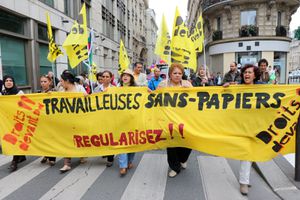From the perspective of the State, young asylum seekers and young undocumented residents are the same. They are not supposed to be `here’. They are not supposed to speak up, and certainly not for themselves. Under no circumstances are they to succeed. Unkempt citizens of the unwashed criminal classes, they are to stay in the shadows … as shadows. This week, , in France, and Yashika Bageerathi, in England, are the faces of democracies’ new witch-hunt, and they reveal that a specter haunts Europe.
Thais Moreira is a 20-year-old student who came to France, from Brazil, in June 2009. She came with her mother. Since her arrival, Moreira has been a model student, resident, everything. She has fully integrated herself into her neighborhood, school, and new country. In mid February, she went to the local police station for `regularization.’ According to French law, if one has been in the country for five years and has completed three years of schooling, one can apply for residence papers. Some bureaucrat decided that Moreira had only arrived in France in 2010. And so, on March 7, she received the dreaded OQTF, or Obligation de quitter le territoire français. The letter gave her 30 days to leave the country.
Yashika Bageerathi is 19 years old. With her mother, younger sister and brother, a 16-year-old Bageerathi arrived in England in 2012, fleeing physical violence from a family member in Mauritius. Last week, Yashika Bageerathi was informed that, since she was now of majority, her case had been separated from that of the family, and her application for asylum was denied. She was to report to Yarl’s Wood. She was sent to the airport where, apparently, British Airways refused to give her passage. This seemed like a reprieve … until the State responded to the young woman’s appeal to not be separated from her family. The Home Department’s replied, “Fine, the whole family’s denied asylum, and you’re all going back to Mauritius.” That’s where the situation sits now.
In both Thais Moreira’s and Yashika Bageerathi’s cases, students and staff mobilized and organized. They have protested, marched, organized Twitter campaigns (check out #FightforYashika), organized petitions, and more. They have raised a mighty ruckus. And they are asking questions, especially about “the yawning gap between official rhetoric against immigrants “who do not fit” and the violent reality of expulsion and deportation.”
From the Dreamers in the United States to Thais Moreira in France to Yashika Bageerathi (and before her, Lorin Sulaiman) in England, young people, students all, are protesting the witch-hunt that is immigration policy. And it’s not just those students who are asylum seekers or undocumented residents. It’s their friends as well, the students they study, play, and live with. They confront State viciousness with hope and creativity. They oppose State callousness with love. Who’s the teacher and who’s the student now? Stop the democracies’ witch-hunt. Empty the immigration prisons. Stop the deportations … now!
(Photo Credit: http://www.comunidadebrasileiranafranca.com)
